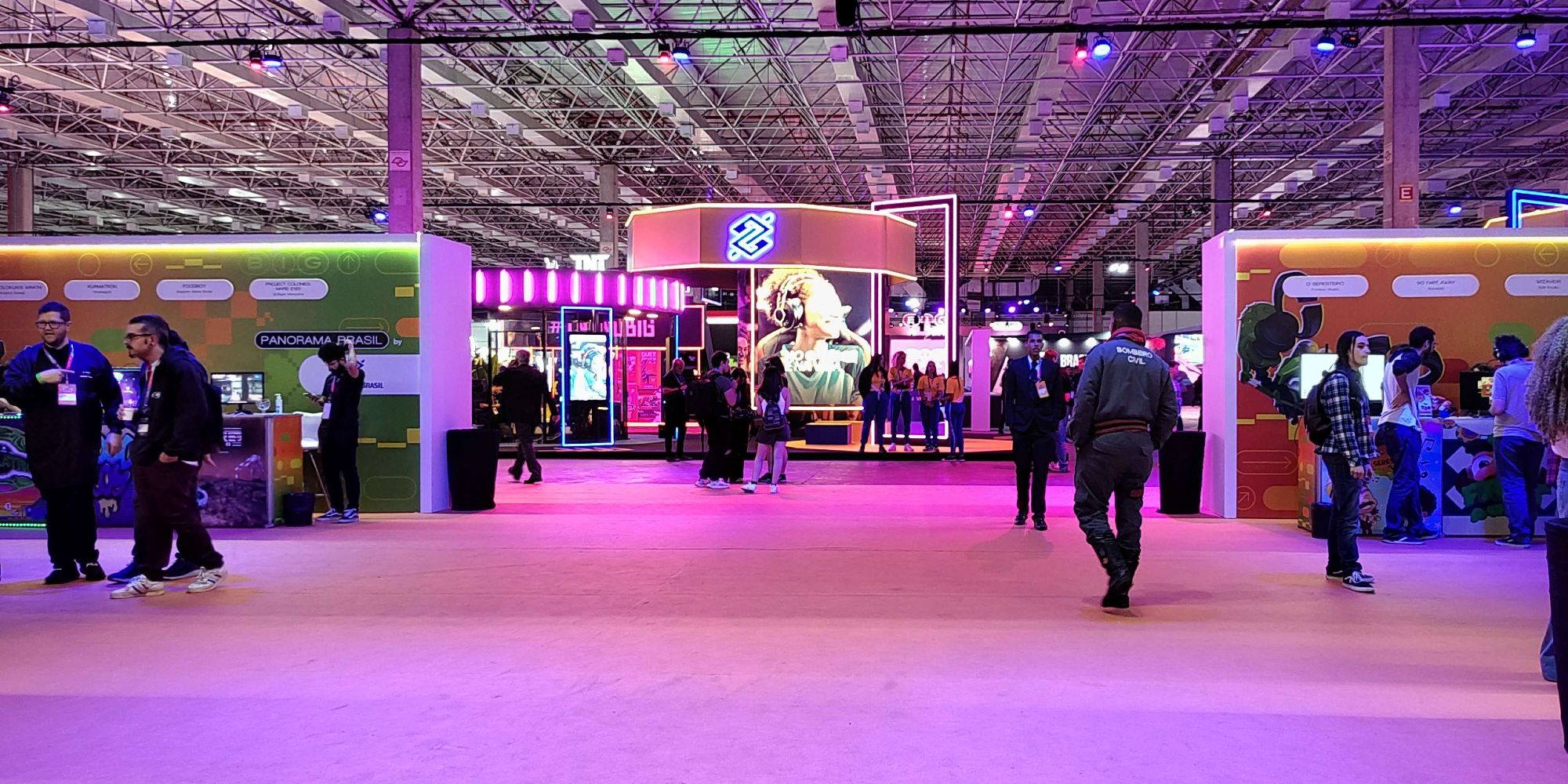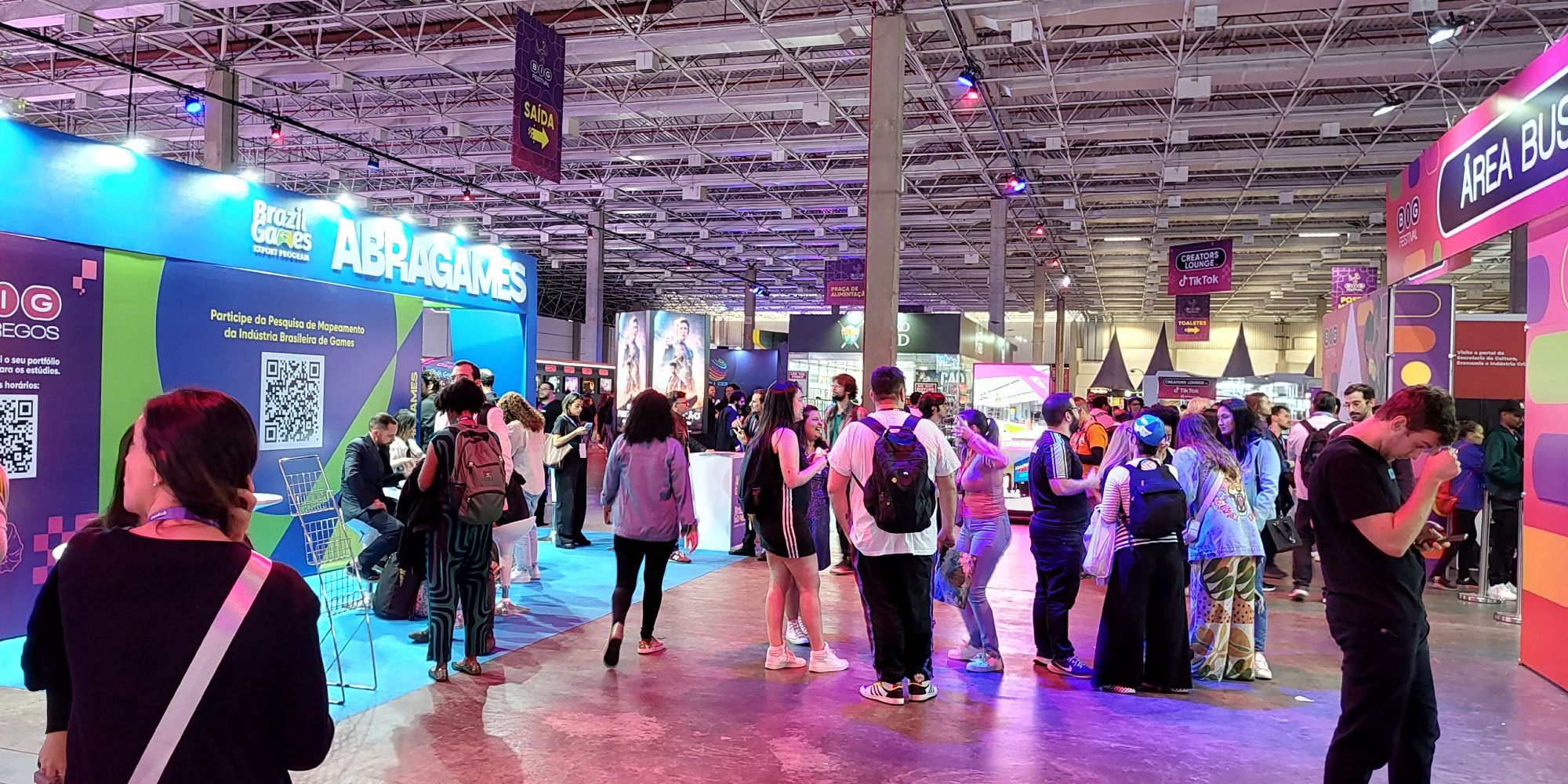Drinking soda in the business area of the BIG Festival, I can see journalists, representatives of different government departments, game developers, and other colorful folks, all walking around making acquaintances, all flocking to Latin America to make it happen. The place is full of vibrant energy, and folks can enjoy hundreds of indie games on display.
The BIG Festival is the biggest gaming event in Latin America, with a mixture of publishers like Nintendo, Atari, and Riot Games attending the expo, as well as independent developers from all over the region. While this is a big space with several huge names making their presence known, the core of the event has remained.
Eleven years ago, the Brazil Independent Games Festival was opened to the public for the very first time. “It started in a room that was maybe… ten times bigger than the one we’re in,” says Gustavo Steinberg, the creator and executive director of BIG. “It happened in a museum, the São Paulo Museum of Image and Sound. It’s a very nice place, but a small one, so it was already too small even in the first edition.”
In the beginning, Steinberg quickly understood how significant the gaming industry was and what its growth would mean for the region, “I’m a filmmaker myself, and thanks to being part of that I know the importance of events like these for independent creators,” he explains. “We didn’t have any events of that kind in the region, so I started talking to developers, and people who understood video games. We needed to assemble a group of good professionals to start the scene.”
As years passed and the festival grew, it stopped being a space for the Brazilian gaming industry and became a hub for Latin America as a whole. “We decided that it was important to do it not only for Brazil but for the whole region since it’s difficult to catch the attention of the press down here as it is, even more so if there were several events like this in different parts of Latin America”.
The Panorama Brazil stand isn’t too far from the room we’re in, where a lot of independent game developers can present their games and take their first steps, with some of them even being just students right now. “Latin America is a hub for gaming development, and people are waking up to this fact, a little bit late, I might say,” he laughs. “There’s a lot of opportunities, both in development, studio acquisitions, services, and such”.
When I talk about possible collaborations with more triple-A publishers in the future, Steinberg seems hopeful. “There are a lot of people we want to bring here, some even in the works right now. I won’t name names though,” he adds with a smile. However, he doesn’t lose focus on where the event core stands. “We want to keep the indie vibe because this is an event for creators of any kind”, he says. “Anyone is welcome here, but at the end of the day, this is a space where we want to highlight and talk to people who create games”.
During my second day at the event, I met with Nicolas Rabago and Nahuel Leandro, gaming marketing managers of MKTR Agency, a marketing agency from Argentina that operates within the whole Latin American region. MKTR work with teams like KRU Esports, and bring the presence of juggernauts like Playstation and Hoyoverse closer to a region that’s eager to consume more.
“With the USA and Europe being the most established markets these days and having stable audiences, the opportunity for growth falls on Latin America”, he explains. “Companies are interested in this region that keeps evolving constantly, and the industry is growing steadily, with new ways to enter added every day, and esports, mobile gaming, and streaming becoming more popular.”
With a moment so crucial for the Latam gaming industry, the focus has never been more clear. “Our focus is always to help the region to grow, and right now we’re working as best as possible to release Latin American gaming content that gets to be known globally”.
Marcio Filho, president of RING, the Association of Digital Game Developers of the State of Rio de Janeiro, shares this focus. This association is constantly working with governments, education institutions, and private companies to foster the digital games industry and help it grow across the region.
“We get to be here thanks to the collaborative work of all those entities, which allows us to bring a group of several independent game developers here to the festival,” he explains. “During the last year we made huge progress to work together with public entities that could help us to promote the work of different developers not only across Brazil but globally as well, and it’s with that goal in mind that we’re going to Gamescom later this year as well.”
With Gamescom around the corner, I also talked with Rodrigo Terra, president of Abragames and Brazil Games, the entities that will be partnering with Gamescom this year, bringing Brazil’s best games to the popular expo.
“We didn’t expect to be invited to it, really,” he says with a laugh. “In the past, Gamescom invited countries that they recognized as great gaming development centers in the world, and obviously we’ve been working with great emphasis here for years now,” he explains. “Then they came to analyze the industry, its ecosystem in the region, and they recognized our growth and decided to invite us as partners. So it was really a surprise and an honor, and after a journey of eleven years, it is a delight to attend this international event in this fashion.”
Brazil Games has always participated in Gamescom (only missing the first two events), with the idea of fostering gaming development in Brazil and creating opportunities for smaller studios to reach international audiences, and a partnership with Gamescom will only increase this.
“Thanks to us living in a moment where creativity is highly appreciated, we get to show diverse Latin American games with many cultural aspects impacting on their art, music, and narrative, and that can make a difference in the industry as a whole,” Terra explains. “We want to show everyone that Latam can be a very big player in this modern gaming landscape”
When I ask him about what kind of changes and benefits he expects to see in the longer term thanks to this partnership, Terra takes a minute before responding. “Well, for gamers around the world, Gamescom is one of the biggest events, and very representative of what the industry is as a whole. I think that our expectations involve getting to reach a wider audience because Brazil and Latam [Latin America] are today hotspots for creativity in gaming development and potential business partnerships,” he says. “We would also like to see more Brazilian delegations attending different international events, and helping to give independent developments the protagonism they deserve as well.”
Across the four days I attended this juggernaut of an event, I witnessed a variety of talks, panel discussions, upcoming projects, and countless independent video games. I left with a sense of satisfaction, accomplishment, and anticipation for the years to come. We’re experiencing Latam’s moment right now, and with so many interesting projects going on and so many talented people working on it, I can only feel hope for the future of my home’s gaming industry.



